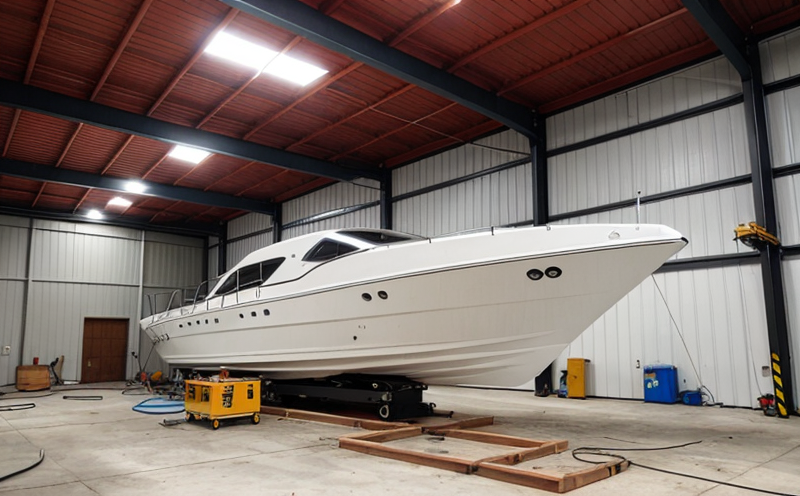ASTM D570 Water Absorption Testing of Hull Polymers
The ASTM D570 standard provides a comprehensive approach to assessing the water absorption properties of polymers used in marine and ship hull construction. This test is critical for ensuring that materials can withstand prolonged exposure to seawater, which can lead to significant degradation over time. The method involves submerging specimens in deionized or distilled water at 23°C (73°F) for a specified duration, after which the samples are weighed both before and after immersion.
The primary goal of this testing is to evaluate how much water a polymer can absorb under controlled conditions. This property is crucial because it directly impacts the durability, integrity, and performance of hull materials in maritime environments. Proper absorption control ensures that ships remain buoyant and structurally sound, preventing potential safety hazards.
The ASTM D570 method is widely recognized for its accuracy and reliability, making it a key standard in the marine industry. It helps manufacturers and quality assurance teams identify polymer formulations that can withstand harsh conditions without compromising their physical properties. This testing process is particularly important for polymers used in coatings, adhesives, and structural components of ships.
During the test, specimens are prepared according to ASTM D570 specifications, which include precise dimensions and surface finish requirements. These preparations ensure that the results are consistent and reproducible. After soaking, the samples are removed from the water, dried at 60°C (140°F) for a specified time, reweighed, and then recalculated to determine the percentage of water absorbed.
The accuracy of this test is paramount, as it can influence the lifespan of marine structures. For instance, hulls made from polymers with high water absorption rates may experience premature deterioration, leading to increased maintenance costs and potential safety risks. By adhering to ASTM D570 standards, manufacturers can ensure that their products meet industry requirements and are suitable for long-term use in maritime applications.
The significance of ASTM D570 cannot be overstated, especially given the diverse range of polymers used in marine construction. From thermoplastics to elastomers, each material has unique properties that must be evaluated under controlled conditions. This testing ensures that all materials are suitable for their intended applications, thereby enhancing overall safety and performance.
Understanding the water absorption behavior of hull polymers is essential for both research and development (R&D) teams and procurement professionals. By leveraging ASTM D570 standards, these stakeholders can make informed decisions about material selection and quality assurance processes. This ensures that only the highest-quality materials are used in marine construction, ultimately contributing to safer, more reliable ships.
Industry Applications
- In shipbuilding: Ensuring hull integrity against seawater intrusion and degradation.
- In offshore oil and gas industries: Evaluating the durability of protective coatings in harsh marine environments.
- In recreational boating: Assessing material performance for pontoons, pontoons, and other floating structures.
- In naval architecture: Providing insights into the long-term behavior of composite materials used in ship design.
Environmental and Sustainability Contributions
The ASTM D570 test plays a vital role in promoting sustainable practices within the marine industry. By ensuring that hull polymers maintain their integrity under water exposure, this testing helps reduce the need for frequent repairs and replacements, which can lead to significant environmental impacts. Properly designed and tested materials contribute to longer-lasting ships, reducing waste and resource consumption.
Additionally, ASTM D570 supports the development of eco-friendly coatings and adhesives that are less prone to degradation in marine environments. This not only extends the lifespan of ships but also minimizes the environmental footprint associated with frequent replacements or repairs. By adhering to these standards, manufacturers can contribute to a more sustainable future for maritime operations.
Competitive Advantage and Market Impact
Adhering to ASTM D570 provides a competitive edge in the marine industry by ensuring that products meet stringent quality standards. This standardization enhances reliability, which is crucial for maintaining market reputation and customer trust. By offering materials with consistent water absorption properties, manufacturers can differentiate themselves from competitors who may not adhere to such rigorous testing.
The ASTM D570 test also facilitates compliance with international maritime regulations, thereby opening up opportunities in global markets. This ensures that products are accepted across various jurisdictions, reducing the need for additional certifications and increasing market access. In a highly competitive industry, this standardization can significantly enhance a company's position in the marketplace.
Furthermore, by ensuring that hull polymers perform consistently under water exposure conditions, companies can reduce warranty claims and improve customer satisfaction. This not only builds brand loyalty but also fosters long-term relationships with clients and partners. The ability to provide reliable products is increasingly important as customers demand more durable and environmentally friendly solutions.





